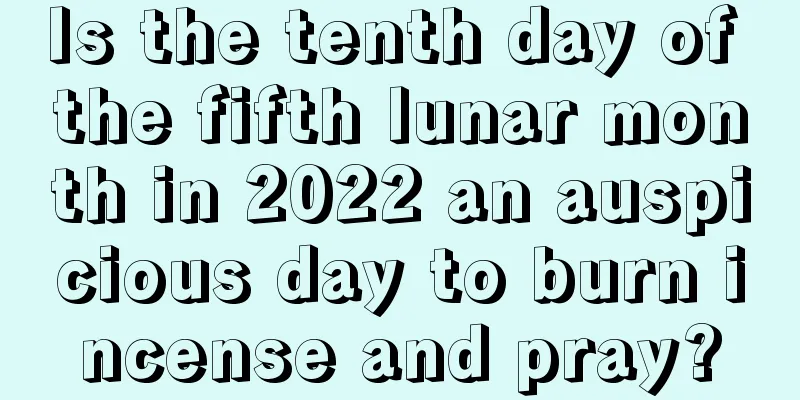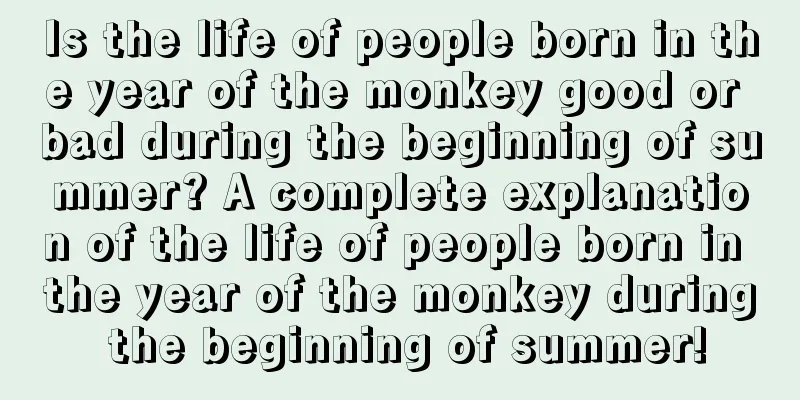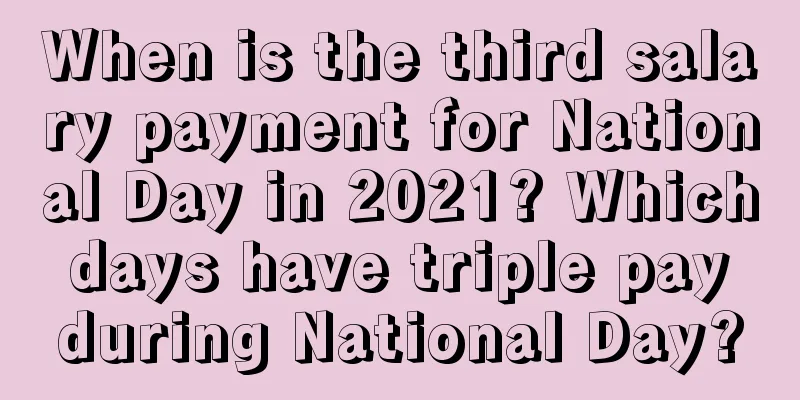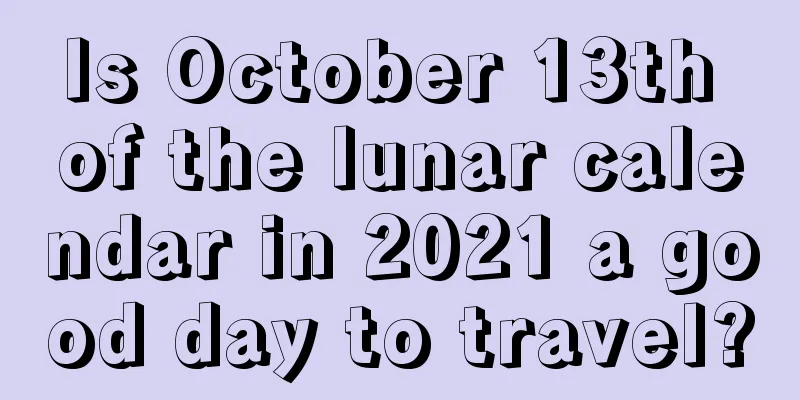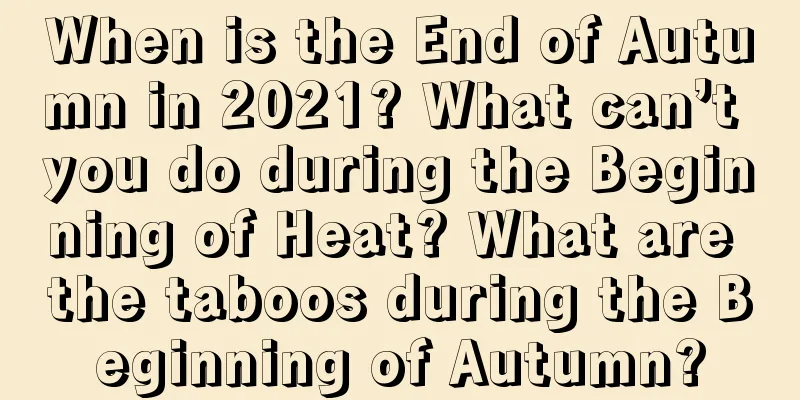What are the origins and legends of the Double Ninth Festival? Is it suitable to get a haircut on Double Ninth Festival?

Introduction: The Double Ninth Festival is a day that everyone cares about. Those of us who are alone in a foreign land must be concerned about the elderly at home. We all have a filial heart, and the Double Ninth Festival cultivates a more filial heart in us. The Fortune Teller website has planned special content about the Double Ninth Festival for everyone, let’s experience it together!What are the origins and legends of the Double Ninth Festival?The Double Ninth Festival is also known as the "Double Ninth Festival" or "Old People's Day". There are many activities during the Double Ninth Festival, including climbing mountains, appreciating chrysanthemums, drinking chrysanthemum wine, flying kites, eating Double Ninth Cake, inserting dogwood and so on.The Double Ninth Festival originated in the Warring States Period and was originally a happy day. The ancients classified all things in the world into two categories, yin and yang. Yin represents darkness, while yang represents light and vitality. Odd numbers are yang and even numbers are yin. Nine is an odd number and therefore belongs to Yang. On the ninth day of September, the sun and the moon meet at nine, and the two Yangs overlap, so it is called "Double Ninth Festival". The Double Ninth Festival is called the Double Ninth Festival because it has the same pronunciation as “long” (jiujiu), and nine is the largest number, so it implies longevity. Moreover, autumn is the golden season for harvest in the year. The Double Ninth Festival has profound meaning. People have always had special feelings for this festival. There are many excellent poems and lyrics in Tang poetry and Song poetry that celebrate the Double Ninth Festival and sing the chrysanthemum. The origin of Double Ninth Festival can be traced back to before the Pre-Qin period. The "Jiu Qiu Ji" in "Lüshi Chunqiu" records: "(In September) the household steward is ordered to prepare for the harvest and to collect the five important kinds of crops. The harvest is stored in the emperor's register in the sacred granary, and it must be handled with great respect and care." "On this day, a great feast is held to the emperor, sacrifices are offered, and the preparations are reported to the emperor." It can be seen that at that time there were already activities to offer sacrifices to the emperor of heaven and ancestors when the crops were harvested in September in autumn to thank the emperor of heaven and ancestors for their kindness. In the Han Dynasty, "Xijing Miscellaneous Records" recorded that Jia Pelan, a palace lady of the Western Han Dynasty, said: "On the ninth day of the ninth month, people wear dogwood, eat puffball, and drink chrysanthemum wine, which is said to make people live longer." It is said that from this time on, the custom of praying for longevity on the Double Ninth Festival began. This was influenced by the ancient wizards (later Taoist priests) who pursued immortality and collected medicines for consumption. At the same time, there are large-scale banquets, which developed from the banquets celebrating the harvest in the pre-Qin period. "Jingchu Sui Shi Ji" said: "On the ninth day of the ninth month, four classes of people gather together for feasting and drinking." Du Gongzhan of the Sui Dynasty commented: "It is unknown when the custom of holding banquets on the ninth day of the ninth month began, but it has not been changed since the Tang Dynasty to the Song Dynasty." Seeking longevity and feasting form the basis of the Double Ninth Festival. One day, the immortal called Heng Jing to his side and said to him, "Tomorrow is the ninth day of the ninth lunar month, and the plague demon will come out to do evil again. Now that you have learned the skills, you should go back and eliminate this harm for the people!" At this time, the immortal gave Hengjing a bag of dogwood leaves, a bottle of chrysanthemum wine, and taught him the secret to ward off evil spirits, and asked Hengjing to ride the crane back home immediately. Heng Jing returned to his hometown, and on the morning of September 9th, he led the villagers to a nearby mountain as instructed by the immortal and gave each of them a piece of dogwood leaf and a cup of chrysanthemum wine. At noon, the wind howled violently, the north wind suddenly rose, the sky was dark, and with a few shrill roars, the plague demon rushed out of the Ru River and rushed down the mountain. At this moment, the plague demon suddenly smelled the strange flavor of dogwood and the mellow fragrance of chrysanthemum wine. His face suddenly changed, and he trembled, not daring to move forward. In a flash, Hengjing rushed down the mountain with a sword in hand. After several rounds of fierce fighting, Hengjing stabbed Wen Mo to death and the plague was eliminated. From then on, the custom of climbing high places to avoid epidemics on the ninth day of the ninth lunar month every year has been passed down year after year. It is said that in the traditional concept of the Central Plains people, the double nine symbolizes long life, health and longevity, so people also call the Double Ninth Festival the Elderly Day. The Double Ninth Festival has historical origins. As early as the Spring and Autumn Period and the Warring States Period, Qu Yuan wrote in "Far Travel": "Gathering on Double Ninth Festival, I entered the imperial palace and visited the Qingdu at the beginning of the ten days." During the Three Kingdoms period, Cao Pi said in "Letter to Zhong Yao on the Ninth Day": "Years go by and months come, and suddenly it is the ninth day of September again. Nine is a yang number, and the sun and the moon correspond to each other. People praise the name and think it is suitable for longevity, so they enjoy banquets and reunions here." He has clearly written about the Double Ninth Festival banquet. In the preface to the poem "Idleness on the Ninth Day" by Tao Yuanming of the Jin Dynasty, he said: "I am idle and love the name of Double Ninth Day. The garden is full of autumn chrysanthemums, but I have no wine to drink. I am only wearing the ninth day of the ninth month and expressing my feelings with words." The mention of chrysanthemums and wine at the same time here shows that in the Wei and Jin Dynasties, there was already a custom of drinking and appreciating chrysanthemums on the Double Ninth Festival. In the Tang Dynasty, Double Ninth Festival was officially designated as a folk festival. In the Ming Dynasty, on the Double Ninth Festival in September, the whole palace would eat flower cakes together to celebrate, and the emperor would personally climb Wansui Mountain to express his feelings about autumn. This custom was passed down until the Qing Dynasty. Is it suitable to get a haircut on Double Ninth Festival?Suitable for: planting, litigation, fasting and offering sacrifices, seeking offspring, resolving disputes, raising livestockThings to avoid when tailoring : getting married, returning home, traveling, moving, raising beams, burying people, offering sacrifices, praying, erecting pillars, installing doors, building houses, building stoves, moving into houses, building, breaking ground, building embankments, releasing water, accepting betrothals, holding funerals, opening markets, seeking wealth, collecting wealth, and taking up positions According to the lunar calendar table of auspicious and inauspicious days, today is marked as [tailoring]. It is a good day for having a haircut, so you can get a haircut. Which days are suitable for haircut in September of the lunar calendar in 2017?September 3, 2017 in the lunar calendar (Sunday, October 22, 2017 in the Gregorian calendar) (tailoring, seeking medical treatment)Lunar calendar September 5, 2017 Gregorian calendar October 24, 2017 Tuesday (Seeking medical advice) Lunar calendar September 6, 2017 Gregorian calendar October 25, 2017 Wednesday (Seeking medical advice) September 7, 2017 in the lunar calendar (Thursday, October 26, 2017 in the Gregorian calendar) Lunar calendar September 8, 2017 (Friday, October 27, 2017) (Seeking medical advice) Lunar calendar September 9, 2017 Gregorian calendar October 28, 2017 Saturday (tailoring) Lunar calendar September 15, 2017 Gregorian calendar November 3, 2017 Friday (tailoring) Lunar calendar September 17, 2017 Gregorian calendar November 5, 2017 Sunday (Seeking medical advice) Lunar calendar September 18, 2017 Gregorian calendar November 6, 2017 Monday (Seeking medical advice) September 20, 2017 in the lunar calendar (Wednesday, November 8, 2017 in the Gregorian calendar) September 21, 2017 in the lunar calendar (Thursday, November 9, 2017 in the Gregorian calendar) (Seeking medical advice) Lunar calendar September 22, 2017 Gregorian calendar November 10, 2017 Friday (tailoring) Lunar calendar September 24, 2017 Gregorian calendar November 12, 2017 Sunday (tailoring, crowning) Lunar calendar September 28, 2017 Gregorian calendar November 16, 2017 Thursday (tailoring) Lunar calendar September 29, 2017 Gregorian calendar November 17, 2017 Friday (Seeking medical advice) |
>>: What day is the sixth day of the ninth lunar month in 2017? What month and date is it?
Recommend
Recommended auspicious dates for weddings on Laba Festival in 2020. Why is it said that the New Year comes after Laba Festival?
Introduction: You must choose an auspicious day fo...
Query the location of the God of Wealth at each hour of the twelfth month of the lunar calendar in 2020
The cold winter brings us to the New Year, and De...
Do boys born in the year of Grain Full in 2020 have good fortune? What is the Grain Full Festival to worship the God of Vehicles?
Everyone’s birth time is related to their future d...
How about April 27th of the lunar calendar in 2022? Is it an auspicious day for funerals and burials?
The fourth month of the lunar calendar usually has...
Is August 23, 2019, the beginning of heat, an auspicious day for opening a new store? What can’t you eat during the beginning of heat?
Introduction: Opening a new store is an important ...
What taboos should be paid attention to when placing the fish tank? The fish tank should not face anything related to fire?
Introduction: In today's home decoration, fish...
Is the fate of a girl born on the 20th day of the twelfth lunar month in 2021 good or bad? Is she blessed?
The twelfth lunar month is a month with many sacri...
Are people born on Qingming Festival in 1988 destined to be rich and noble? Analysis of the three noble people who are compatible with the dragon!
Introduction: Many new lives are born during the Q...
Is it a good time to get a marriage certificate during the Grain Full Festival in 2020? What does the word “man” in the solar term Grain Full mean?
Introduction: Generally, you need to choose an aus...
Bu Yifan talks about the Feng Shui placement of fish tanks in companies and homes
Fish tanks are often made of transparent glass, wh...
Is October 20th of the lunar calendar in 2017 an auspicious day?
Introduction: The days of each of the 365 days in ...
Is it a good time to get married or engaged on December 18, 2019 in the lunar calendar? Check your marriage and love fortune!
Marriage is the last stage of love, from dating t...
Interpretation of the origin and legend of the Lantern Festival on the 15th day of the first lunar month
Introduction: The Lantern Festival has a long hist...
Where is the God of Wealth on the 15th day of the ninth lunar month in 2018?
Mr. Shui Mo has carefully compiled detailed infor...
What is the lunar calendar for December 11th, 2021? Can we start work?
The twelfth lunar month is at the end of the year,...

